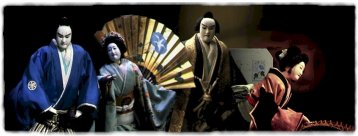 ) was the sh
) was the sh gun family who established the Edo period. They moved the capital to Edo, which is today's Tokyo.
gun family who established the Edo period. They moved the capital to Edo, which is today's Tokyo.
UCLA Japanese 60 - Image of Japan, Lecture Note
Week 7 (Winter 2001) - February 23, 2001.
The Edo Period (1603-1868)
Tokugawa (  ) was the sh
) was the sh gun family who established the Edo period. They moved the capital to Edo, which is today's Tokyo.
gun family who established the Edo period. They moved the capital to Edo, which is today's Tokyo.
Neo-Confucianism - "neo" because in the 13th century, there was a new interpretation of the classical Chinese Confucianism originally written by Chu Hsi. Neo-Confucianism was popular because it talked about reality, the way to create social order (which was useful to ruler), not only about dream.
Social class distinction was clear cut in the Edo period, called
Shi (  ) - Samurai being the highest rank because they fought for the land
) - Samurai being the highest rank because they fought for the land
N (
(  ) - Farmers being the second because they produced food
) - Farmers being the second because they produced food
K (
(  ) - Artisans being the third because they produced tools
) - Artisans being the third because they produced tools
Sh (
(  ) - Merchants being the lowest because they did not produce anything other then exchanging money and gain from this exchange without much concrete contribution to the society
) - Merchants being the lowest because they did not produce anything other then exchanging money and gain from this exchange without much concrete contribution to the society
The Emperors were said to be "above the clouds" (above the these rankings), but in terms of actual ruling power, they had none. They were only used as a symbol. Sh guns were the ones in power.
guns were the ones in power.
Notice the aristocrats were not in the picture of the social ranking during the Edo period.
Although merchants were lowest in social class, they were rich, and were important in the economical point of view. Shoguns often times had to borrow money from the merchant for operation of the clan. And often times, the merchant could not get their money back from the shogun because they could be killed if they forced the shogun too hard.
Pleasure quarters - for entertainment of mainly merchants. There served theater plays and also prostitution.
J ruri
ruri  theater ( puppet theater, on of the 3 elements of Bunraku
theater ( puppet theater, on of the 3 elements of Bunraku  theater ) topics mainly deal with:
theater ) topics mainly deal with:
 ) of a samurai to lord, children to parents, and wife to husband, under all circumstances. About loyalty and respect.
) of a samurai to lord, children to parents, and wife to husband, under all circumstances. About loyalty and respect.

 ) - what you should express even though it's oppressed by the society.
) - what you should express even though it's oppressed by the society.


Literary Work by Chikamatsu Monzaemon (  ) - A Love Suicide at Amijima
) - A Love Suicide at Amijima
About the feelings of a merchant (named Jihei) towards a prostitute in a pleasure quarter who's sold by her father. Even he fell in love with her, that merchant was married and had two children. What kept him from being with that prostitute together was the merchant's duty to his wife (named Osan) and children, and the lack of money to buy the contract of the prostitute. They were confined by the firmly established social rules. The only way that they could be together was to be reborn, a common concept of Buddhism. The "way to go" ( Michiyuki  ) was a double suicide (Jinju). This story describes a battle between duty and passion.
) was a double suicide (Jinju). This story describes a battle between duty and passion.
This movie was filmed in the 60's, when the theme Eros-Thanatos (Love & Death) was very popular. The act of love is to die with someone. It is also a way to be with someone forever.
The black-clothed men were actually the puppeteers in Joruri theater. In the film, those puppeteers symbolized the manipulators of life.
In Edo period, married women blackened their teeth, in contrast to women in the Heian period, when only the un-married women blackened their teeth.
Pathos - the ability to feel and respond to things. It's a virtue cultivated by experiencing literary works, like the Noh theater during the time of the Edo period. People in the Edo period were fed up with the idea of intellect, logos, and reasoning. They wanted to give feelings and passions a position in the society.
*About Exam:
There will be 3 essay questions in the final exam.
Here for lecture note of Week 6.
Here for lecture note of Week 8.